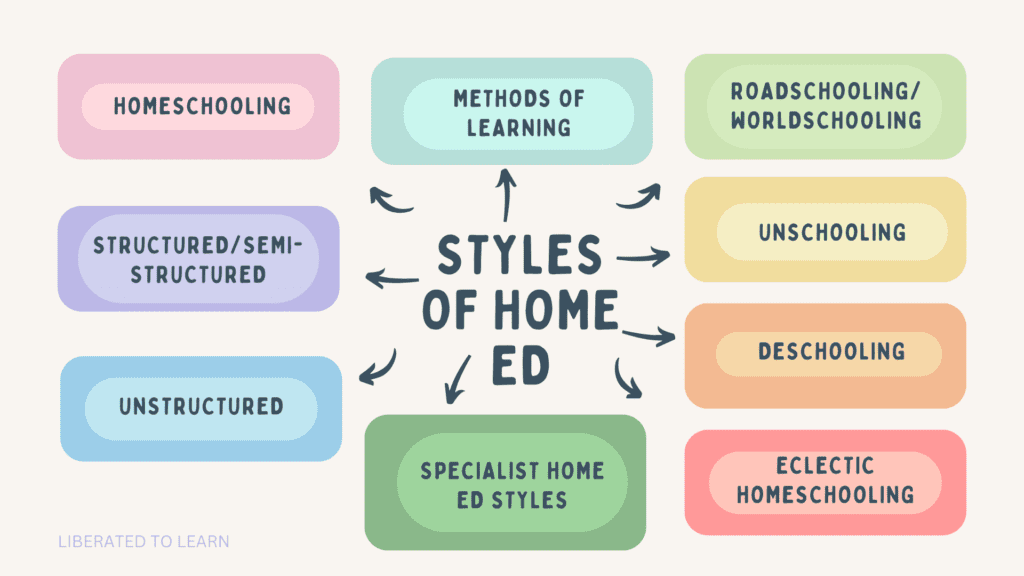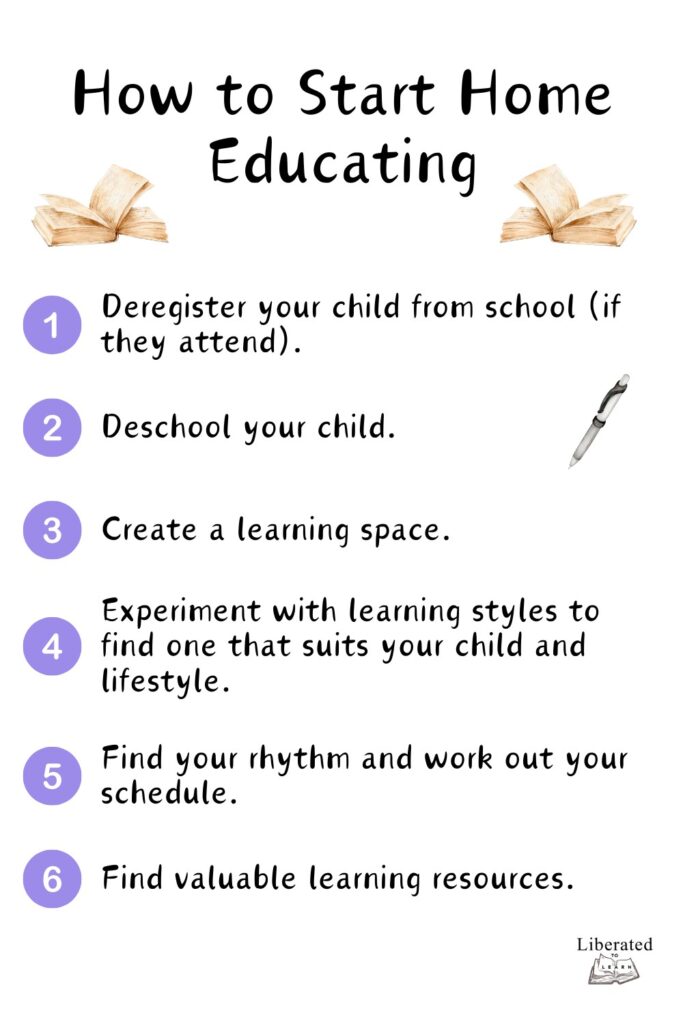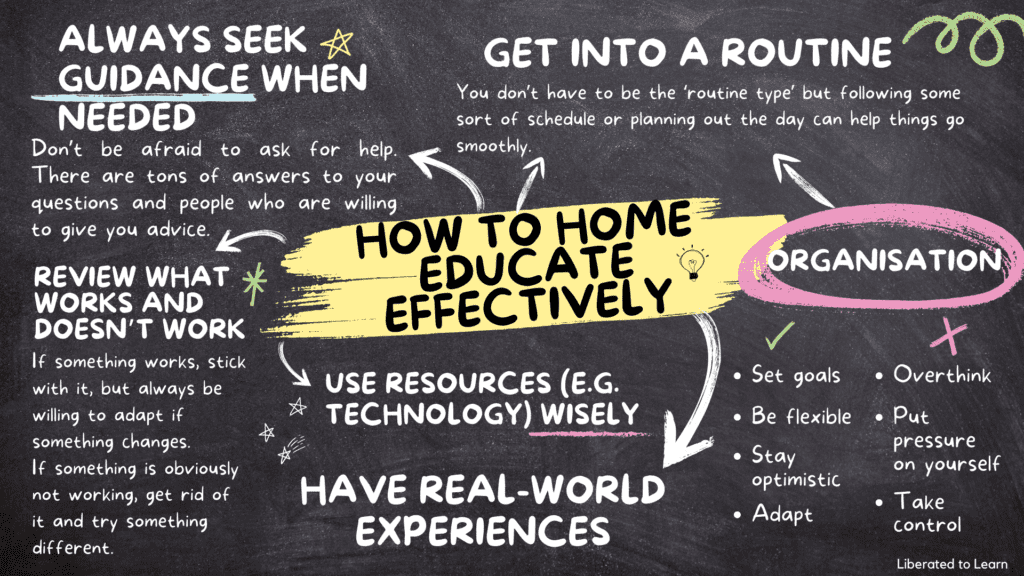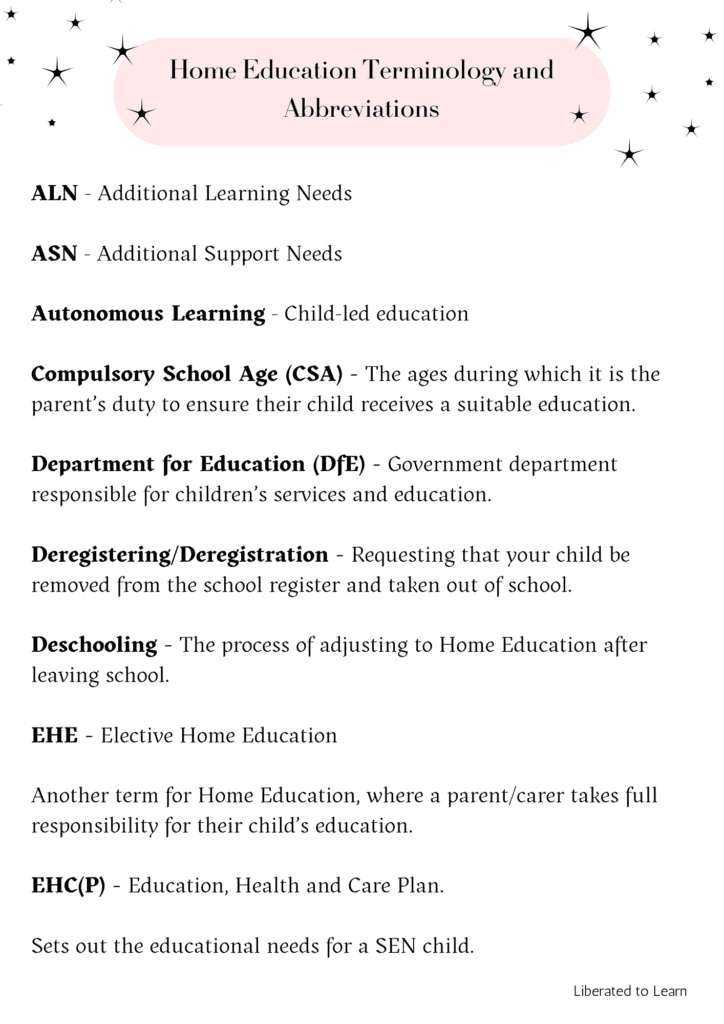Whether you’re wondering how to deregister your child from school, or want to learn about different learning styles, this guide has everything you need to know so that you can start home education successfully.


Contents
So, you’re thinking about home education. That’s great! And it may feel daunting, which is completely understandable. Don’t worry, this guide was made for beginners. Whether you’re wondering how to deregister your child from school, or want to learn about different learning styles, this guide has everything you need to know so that you can start your home education journey successfully. So, sit back, take a read and enjoy!
What is Home Education?
To put it simply, home education places the responsibility of a child’s education in a home educator’s hands (yours). Instead of attending a public school, home educated children are taken out of the system and taught at home. It’s a choice that isn’t made lightly and it should always be done with your children’s best interests at heart.
Home education supports a greater freedom of learning, allowing children to follow their own interests and curricula. The way in which the learning is implemented can be entirely flexible or structured, depending on what works for both you and your children.
You are entitled to take your children out of school (deregistering) at any age (that’s right, any age) and start your home education journey. You also do not have to follow the National Curriculum (in the UK). The choice of curriculum, or whether you even have one, will be completely up to you and the interests of your child.
Remember, education is compulsory but school is not.
Home Education Terminology & Abbreviations
ALN – Additional Learning Needs
ASN – Additional Support Needs
Autonomous Learning – Child-led education
Compulsory School Age (CSA) – The ages during which it is the parent’s duty to ensure their child receives a suitable education.
Department for Education (DfE) – Government department responsible for children’s services and education.
Deregistering/Deregistration – Requesting that your child be removed from the school register and taken out of school.
Deschooling – The process of adjusting to Home Education after leaving school.
EHE – Elective Home Education
Another term for Home Education, where a parent/carer takes full responsibility for their child’s education.
EHC(P) – Education, Health and Care Plan.
Sets out the educational needs for a SEN child.
EWO – Education Welfare Officer
They are responsible for children not attending school. They work with parents under different circumstances to ensure that children are receiving a suitable, full-time education.
Forest School – A place where education takes place outdoors. It encourages a love for learning and the natural environment.
HE – Home Education or Home Educator
Where a parent/carer takes their child out of school and educates them at home.
Home Ed Co-op – A Home Education group where the parents take turns in providing resources and leading the learning.
HEFF – Home Educating Families’ Festival
An annual week-long festival run by volunteers for Home Educating families.
Home Education Report – A document to show how you are given your child a suitable, full-time education.
Homeschooling – An American term to describe Home Education, although it can also be a style of choice for your child’s education.
Home Visits (HV) – Usually done by a EWO, although there is no obligation to have them or for home educators to accept them.
HRA – Human’s Rights Act
LA/LEA – The Local Authority or Local Education Authority
Your local authority or council which monitors children’s education and ensures that they are receiving a suitable one.
Mission Statement – A set of educational goals and how you want to carry out Home Education.
National Curriculum (NC) – The government-imposed curriculum on all the state schools in the UK.
NTS – Notice to Satisfy
A request from the LA requiring parents to provide information about their child’s education to make sure it is suitable.
SAO – School Attendance Order
An order sent by the LA stating a school that you must send your child to.
SEN – Special Educational Needs
Unschooling – An approach to Home Education which centres on the child’s choices, interests, abilities and pace.
What are the Pros and Cons of Home Education?
As with anything, there are pros and cons to home education. The good news is they can help you to understand how you want to go about things and prepare you for your Home Education journey.
In my opinion, the pros far outweigh the cons (but I would say that!). Of course, there are going to be some challenges, but who says you can’t overcome them!
Pros of Home Education
-
- Flexibility with everything (when your child learns, how they learn, flexibility on days out and holidays)
-
- Reduced bullying and peer pressure
-
- Children can follow their own interests
-
- Children can learn at their own pace
-
- Individualised learning and one-on-one time
-
- More time spent with family
-
- More time for extracurricular activities
-
- Home education community
Cons of Home Education
- Socialisation issues or lack of friends
- Cost of home education
- Having to deal with the Local Education Authority
- Judgement from outsiders
- Getting the right balance of home life and education
- Parents are with children full-time
- More difficulty applying for higher education
If you’re still debating between home education and school, you’ll want to know the pros and cons of both. We recommend checking out our post on Home Education vs. Traditional Education!
What is the Difference Between Home Educating and Homeschooling?
‘Homeschooling’ is a popular term used around the world and it is often used synonymously with ‘home educating.’ It essentially sees school replicated at home.
In the UK, however, homeschooling is known as a style of home education. Think of home education as a tree. The styles of home education — the ways in which parents can tailor their child’s learning — are the branches, and homeschooling is one of the branches.
There are various styles of home education and one style might work better for your family than it does for another. The best part about educating at home is the freedom to choose how it’s done.
There’s no right or wrong way, just the way that works for you and your children.
“Learning shouldn’t feel unnatural of forced. It’s one of the most natural things in life.”
Liberated to Learn
What are the Requirements for Home Education?
You may be thinking, “I’m not a qualified teacher; how could I possibly teach my children?” Well, the answer is simple: you’re already qualified. In fact, you were qualified the moment you became a parent.
It’s easy to forget that we’ve been teaching our children all along because we do it without thinking. From the moment they are first born, we assist in helping them learn how to feed, walk and talk, so there’s no reason why we can’t assist in their education too.
If you are thinking about, or have decided to home educate, here are a few things you should know:
-
- You do not need permission to home educate (from anyone — including the local authority).
-
- You only need to notify (the school) if you’re taking your child out of school to home educate.
-
- If your child has never started a nursery or school, you do not need to notify anyone.
-
- You do need to notify the school and local authority if your child has special educational needs (SEN).
-
- You can start home educating at any age.
-
- You do not need to replicate school or a classroom at home.
-
- You do not need to follow the National Curriculum.
How Much Does Home Education Cost?

Home education can cost as little or as much as you choose. If your budget is tight, make use of free resources, libraries and cheap days out. However, if you are thinking about what you might have to pay for, here are a few things to keep in mind:
-
- Stationary and essentials
-
- Tutors
-
- Exams
-
- Curricula
-
- Subscriptions
-
- Days out
-
- Transport costs
-
- Food costs
-
- Clubs / extracurricular activities
If your budget is something that you’re worried about, we’ve got just the post for you: How to Home Educate on a Budget!
You can also download our free Monthly Budget Template for Home Education!
Styles of Home Education

Homeschooling
Homeschooling simply replicates school and its structure at home. It often follows the same routine and methods used in public schools, with organised timetables and planned curriculums. The difference being, the home educator finds all the resources, tutors and online programmes to help support their child’s learning.
Home educators may choose to model their child’s education in the same formal way as school, with tests to check progress, age appropriate curriculums and guidance throughout the day.
Benefits:
-
- Easy for new educators as it creates structure and routine
-
- It may offer a smoother transition after deregistering from public school
-
- Gives home educators confidence that they are doing enough
-
- Curriculums are easy to follow
Structured/Semi-Structured
The amount of structure within home education varies from family to family. Some children thrive on structure, whereas others may favour more flexibility.
A structured approach is often planned timetables and resources, and even scheduled lunch breaks and playtimes. This may work better in busier households because everyone will know what they are doing and when.
A semi-structured approach is different because home educators can choose to change up the formal timetable of school. They may choose to do all the learning in the mornings and leave the afternoons free or vice versa. There may also be more flexibility in getting children to do tests or having to complete work by a set date.
Benefits:
-
- Families can keep to a timetable that works for them
-
- Children learn how to keep to a routine and they know what to expect
-
- A bit of flexibility is always good for everybody
-
- You are in control of the day, not someone else
Unstructured
Home educators who use an unstructured approach allow their children the freedom to learn as and when. There are no set timetables or curriculums and the learning can be done anywhere. Children are not completely in charge but they lead the direction of their learning.
This may seem like a risky option. Of course, who’s to say their children won’t want to sit in front of the TV or play video games for hours. However, unstructured learning is far from that. It simply allows children to follow their own interests, which families can then tailor their learning to.
Unstructured learning actually happens from the moment a baby is born. No one devotes a schedule to teaching their child to crawl, walk or talk — it just happens with our guidance and engagement.
Benefits:
-
- Freedom and flexibility
-
- Complete child-led learning, which encourages them to follow their interests
-
- Children are more motivated and likely to develop their own hobbies
Roadschooling/Worldschooling
The freedom of home education is perhaps what is the most enticing about it. The idea of being able to travel and learn is one that is both liberating and doable if you’re prepared and have the finances to do so.
What roadschooling and worldschooling provide, which a public school cannot, is the freedom to learn absolutely anywhere. The world becomes the classroom! It can be as cheap or expensive as you please and you can start and stop it at any time.
Roadschooling is ‘learning on the road’. Many families choose to get a campervan for travel and some might take extended trips. Even a trip abroad can incorporate home education and there’s the freedom to go at any time of year.
Worldschooling provides a unique education to children through the use of travel. It immerses them into a world of culture and tradition and encourages hands-on learning. Let’s not forget exposure to real-life, including life skills, languages, and different environments.
Worldschooling families can choose to travel either full or part-time and incorporate different styles of home education into their teaching and learning.
Benefits:
-
- Sets children up with life skills and a vast knowledge of the world
-
- Gives families the opportunity to travel and bond more
-
- More flexibility and independence for children
-
- Builds more social connections
-
- Children become more culturally aware
Unschooling
Unschooling, also known as autonomous learning or free learning, is the complete opposite of traditional schooling. It places the value of learning on a child’s interests, allowing them to direct their own educational journey.
This child-led style of education focuses on what works for the individual. Not every child is going to want to sit at a table and complete worksheets and not every child is going to want to visit a museum. Some may be great readers, whilst others may be great listeners. The beauty of unschooling is all in the ‘finding out’. Instead of just ‘doing school’, children are able to learn what school means to them.
Unschooling is about a natural approach. Learning can, and should, happen in every aspect of life, not just when we decide. In fact, most of the time we find ourselves learning without even realising.
There are no set subjects or timetables with Unschooling. If one day your child wants to learn about whales, then you can spend as much time learning about whales and other sea creatures! If one day your child wants to learn how to cook their favourite meal, then you can teach them how to follow a recipe! Go with the flow and the more they’ll know!
Benefits:
-
- Motivates children to learn because they are genuinely interested in the topics they are learning
-
- Enables a flexible schedule
-
- Children learn to socialise more naturally
-
- Creates more hands-on learning with practical experiences
Check out: How to Unschool After You’ve Deschooled!
Many home educators may even choose to go a step further and try out radical unschooling.
Deschooling
It’s easy to get confused between deschooling and unschooling. They sound like they should mean the same thing, but that is not the case. Deschooling is often the first step before unschooling. In short, it is the transition from public school education to home education.
When it comes to deschooling, families are breaking away from the restrictions of a public school — classroom settings, formal lessons, exams and expectations — and allowing children to rediscover their love for learning. It’s a big shift for both parents and children, especially when it’s easy to fall into replicating school at home.
But fear not. Deschooling is all about adjustment, and it offers time to try out different styles of home education. If one style doesn’t work out, you can try another one. Or you can even combine elements of one style with another. See what works best for your child and don’t be afraid to experiment!
Benefits:
-
- Easier to progress from school to Home Education
-
- Follows child’s interests
-
- Children rediscover their love for learning
-
- Alleviation of pressure and stress
Learn more about How to Deschool!
Related: How to Deschool a Teenager
40 Deschooling Activities for Teens
Eclectic Homeschooling
Eclectic homeschooling is for those who benefit from combining various elements of different home education styles. This approach is all about the individual and is customised by the child’s needs and interests.
Think of it like a pick-and-mix. The topics, resources, the style of learning and more is all chosen by the eclectic homeschooler.
Benefits:
-
- Customises a child’s learning experience based on their strengths and interests.
-
- Children are able to progress at their own pace without any added pressure.
-
- Families can adapt curricula to work with their schedules and lifestyle.
-
- A more holistic approach to learning.
Methods of Learning (Online learning/project-based)
There are various ways in which home education can be delivered. For example, project-based learning (unit studies) takes a specific topic (let’s say, for instance, money) and explores it within different subjects. Money centres around maths but children can also learn about the history of money or how to make money.
Once one topic is explored thoroughly, another topic can be chosen. This also adds a bit of structure to the learning.
Benefits of Project-Based Learning:
-
- Increases a child’s expertise on the topic that they are learning
-
- Boosts engagement
-
- Choose topics which your child is genuinely interested in
Online learning has become particularly popular for home ed families, especially since the COVID-19 pandemic. It’s easy to see why — there are so many resources online! From free educational websites, such as Khan Academy, to paid resources like EdPlace. And the best thing? You can trial as many as you like until you find the right one for your family.
Benefits of Online Learning:
-
- Budget-friendly resources
-
- Ideal for families with children of different age groups
-
- Can be done at any time
Find out more about the best free and best paid educational websites.
Specialist Home Education Styles
Currently, there are three popular specialist home education styles: Montessori, Charlotte Mason and Waldorf. Each of these educators became renowned for their unique approach to children’s education, and now their philosophies are widely used amongst home educating families.
Montessori
Maria Montessori, an Italian physician and educator in the late 19th and 20th century, studied how children learn naturally. From her findings, the Montessori method was born.
Montessori is a child-led approach to education. It’s about giving children basic resources to spark their own imaginations and encourage independence and self-play. Montessori educators always observe children as individuals and focus on their abilities and interests. Instead of leading the learning, they guide and provide.
It’s easy to distinguish Montessori toys from others due to their simplicity and replication of everyday objects and activities. They encourage hands-on play and sensory exploration. Montessori also encourages learning with mixed-age groups as this allows for collaboration and development.
Benefits:
-
- A more natural approach to learning
-
- Respects the development of each individual child
-
- Nurtures a range of skills (motor, social, life)
-
- Freedom of choice
-
- Lets children work at their own pace
Charlotte Mason
Charlotte Mason was a British educator in the 19th century who developed a more holistic approach to children’s education. She believed in nurturing the mind, body and spirit of a child through the arts, music, language and the outdoors.
Her teachings are encouraged through creative, narrative-rich literature, which she termed “living books.” Through reading, writing and narration, her focus is on enhancing a child’s imagination and engagement.
The Charlotte Mason approach encourages unstructured play and being outdoors. There is also emphasis on having short lessons but a variety of subjects for children to learn.
Benefits:
-
- Family-centred education based on joyful learning
-
- Cultivates a love for life through the arts, language and nature
-
- Lessons are short to maintain engagement and prevent burnout
-
- Contributes to well-rounded individuals
Waldorf
The Waldorf method, also known as Steiner Education, was developed in the early 20th century by Austrian educator Rudolf Steiner. It centres around shaping children through the three distinct stages of their life (early childhood, middle childhood and adolescence), each seven years apart.
Waldorf educators are encouraged to adapt their methods and curricula to enhance their child’s development through each of these stages.
In this approach, early childhood (birth to age 7) focuses on enriching a child’s mind through exploration, imitation and imagination. Play is greatly emphasised and it should be creative and active. Textbooks and technology are not used to encourage more hands-on learning.
Middle childhood (7-14) introduces academic learning and enriches development through artistic and practical activities. Children are encouraged to weave creativity through storytelling, music and so on, alongside academic study.
Adolescence (14-21) shifts to more intellectual independence, allowing students to govern their own values and interests. They take an active role in their own education.
The Waldorf method supports establishing routines and following regular daily, weekly and monthly rhythms. It also encourages children to enjoy childhood and gradually develop at a natural pace.
Benefits:
-
- Learning is age-appropriate and hands-on
-
- Creates lifelong learners
-
- Long-term structure
-
- Adapts to each stage of a child’s life
Remember all these home education styles have their positives and negatives. It’s ultimately up to you and your family to decide which is best, so don’t be afraid of trial and error!
“Every student can learn, just not on the same day or in the same way”
– George Evans
Questions to Ask Yourself Before Home Educating

Personal
- Why do I want to home educate?
- What do my children think about home education?
- How will I fit home education into my lifestyle?
- How much time can I dedicate to home educating?
- How long do I plan to home educate for?
- What personal goals do I want my children to achieve?
- Are there any circumstances which could affect how I home educate?
- Am I willing to educate in whichever style best suits my children?
- Do I have enough help around me?
Financial
- What’s my budget for home education?
- Which free or paid resources am I willing to use?
- How do I plan to home educate alongside my job?
Educational
- Which style of home education speaks to me and my family?
- Which style(s) will most suit my children?
- Am I starting home education from the outset or going to deregister my children from school?
- What educational goals do I want my children to achieve?
- What are our long-term educational goals?
- How will I prepare my children for higher education (if desired) and employment?
Home Education Mission Statement
If you’re still deciding if Home Education is right for your family then there’s one thing that might help you along: writing a Home Education Mission Statement.
What is a Home Education Mission Statement?
A home education mission statement is basically a list of all your home educated decisions and why you made them. Don’t worry, it’s not some formal document. In fact, it’s there to help you and your family, and it can be as short or as long as you like.
Your mission statement can (but doesn’t have to) include:
-
- The style (or styles) of Home Education that you are going to use
-
- Your curriculum choices (if choosing one)
-
- What you hope to achieve (aims and goals)
-
- Why you have decided to home educate
-
- The type of learning environment you wish to create
-
- How often you are going to teach
Remember these are all things which you can summarise or bullet point. Everyone’s mission statement will look different.
Still need help? Check out: How to Write Your Perfect Home Education Mission Statement
How to Start Home Education
Home Education looks different for every family. It’s like art. No two pictures will ever be the same. The best thing about it is the freedom and choice it gives you. You’re free to educate as you please and you have the choice of various styles and endless resources. It’s education as it should be — child-led and fun.
So how do you home educate? Where do you even begin?
Well, here’s an easy step-by-step on how to start.
1. Deregister your child
This first step applies if your child is already in school and you wish to take them out to home educate. To do this, all you need to do is write and send a deregistration letter (or email) to the school’s Head Teacher. It must state that you are taking responsibility for your child’s education by Home Educating and therefore no longer need the school place.
It’s recommended to get a postal receipt or an email acknowledgement to ensure that the school can’t claim that the deregistration wasn’t received.
Double check the process for deregistering your child as it may be different in your country or region.
If you are deregistering your child from an SEN school, you need to request consent from the Local Education Authority first.
Here’s what you should know about deregistering your child from school.
2. Deschool your child
This step follows on from the first step and is for families who have deregistered their child from school. The reason why you might want to deschool your child following deregistration is because they will have become accustomed to the ‘public school’ methods and standards of education and this can be hard to break away from.
Deschooling is the transition period from deregistering to home educating and it should allow your child to fall in love with learning again without any pressure and without any expectations.
3. Decide which Home Education styles you’d like to try out
Whether home educating has always been on the cards or whether it’s something your family have recently decided on, it’s time to find out which style (or styles) you’d like to try out.
First, go with the style which most aligns with your values and, more importantly, your child’s wants and needs. Don’t be afraid to mix and match. Home education isn’t one size fits all. As mentioned before, there are some styles that work better for others. It’s all about trying things out and seeing what’s right for your family.
Remember you don’t have to commit to just one style of education — you can incorporate various values or techniques from a number of them. And you can change and adapt styles at any time during your home educating journey.
4. Work out your schedule & your learning space
When you’ve decided on a learning style (or styles), you can start to think about your home education schedule.
Some home educators create a daily or weekly timetable filled with lessons and activities. Whereas some do not have a timetable at all and simply follow their child’s lead and what their interests are. You could even do a bit of both.
Working out a schedule could also be deciding whether you’re going to do the majority of learning in the morning or the afternoon, or whether you’re going to break it up throughout the day.
Schedule or not — experiment to see what works best for your family.
You can also decide whether you’re going to have a designated learning space or not. Remember not all children will benefit from sitting at a table and doing worksheets. The beauty of learning is that it can be done anywhere!
5. Find valuable resources and curricula
There are so many resources and good quality curricula out there (both paid and free), so don’t be put off if you can’t find the right one straightaway. In fact, there’s no problem with changing a curriculum or deciding that following one is not working out.
Learning is about trial and error. Also, you don’t have to follow the National Curriculum. But you can think about, and discuss whether your child might want to take exams and plan for them.
Remember, your child doesn’t have to follow a curriculum. Many children are more hands-on and learn better in other ways.
6. Buy learning supplies and equipment
If your pocket allows it, you can buy as many learning supplies and essentials as you want. In fact, anything that you think will benefit your child’s education is worth buying. But it’s always good to start with what your child actually needs and buy as you go along.
Don’t stress about buying too much at once as you probably won’t need it all. And remember, your child doesn’t need a lot to learn. In fact, you can make great use out of natural resources too.
Check out our Ultimate List of Homeschool Essentials!
7. Figure out which learning style works best for your child
Figuring out the best learning style can take a bit of time, so don’t worry if your child is not quite there yet. It’s all about experimenting.
Related: Learning Styles of Home Education: Finding the Right One
Once you’ve found a style that works, roll with it. And if at any point you need to change it, do it!
8. Join a Home Education group
Home education groups are really worth joining, especially for social and educational reasons. You get to meet up with like-minded home educators, share resources and make new friends.
These groups will likely be your go-to for tips and advice and finding out what’s going on in your local area. They’re also great for feeling like you’re in the home education community.
Related: 14 Benefits of a Home Education Group
9. Keep a record of any schedules, work and progress
Whilst home educating, it can be worth keeping track of your child’s schedule, work and progress — not only because it’s nice to see how well your child is doing, but also because it will come in handy when, and if, you have to write a home education report to the local authority.
Keeping a record can also help in making future decisions, such as following new interests, changing curriculum, and taking exams.
10. Adapt along the way
One of the great things about home education is its adaptability. There are no set paths or strict rules to follow. If something is not working out, you can change it. And there will always be guidance along the way.
As a home educator, the best thing you can do is make sure that your child is happy with their home education.


How to Home Educate Effectively
We’ve talked about this a lot — there’s no right or wrong way to home educate, but there are a few tips which can make it a lot easier for you to do it, effectively.

Other things to consider are:
- Getting your child involved or letting them take control of the learning
- Balancing quality family time with home education
- Giving yourself days off or breaks when needed
- Limiting expectations
- Not comparing your home education journey to others
Why do People Home Educate?
If you asked this question to several different people, you might get several different answers, or you might get some of the same answers! Everyone’s reasons are personal and valid. So, why might people choose to home educate?
For flexibility
Flexibility is perhaps one of the main reasons why people choose to home educate. There are no strict schedules, no mad morning rushes. Everything is on your own terms and your child is free to learn what interests them the most, however and whenever they please.
If one month your family wants to go away on holiday, you can! You’re not restricted to school holidays anymore and the world becomes a much bigger and exciting place, for you and your child.
Unsatisfied with the traditional schooling system
A lot of people are unsatisfied with the traditional schooling system because it fails their child in some way — whether that be them not learning enough, experiencing mental health issues and bullying, or just not receiving a good quality education.
Home education is a welcome alternative because parents and carers see a change in their child’s happiness and can influence positive changes in their learning.
Children are not benefiting from school
Some children do not benefit from going to school, and that’s perfectly fine. Not every child is going to excel by having to sit at a desk for the majority of six hours or be able to compete against their peers for the best grade in a subject they have no interest in. Home education offers these children a chance to thrive at what they’re good at in the best way possible.
Special Educational Needs are not being met
Although there are often resources in place for SEN children, many parents still feel that their child’s needs are not being suitably met. It might be because they are a minority within the school or that the teachers are not equipped properly or that the resources already in place just aren’t enough.
To spend more time together
Being able to spend more time together is one of the great benefits of home education because you can do so much more with your children.
If children are in school for six hours a day, it really leaves very little time to spend with them one-on-one, and the time that is spent with them isn’t necessarily filled with quality but necessity — mainly because of morning and evening routines and chores etc., that need doing.
To get away from bullying and peer pressure
Some children really struggle at school and bullying is unfortunately prevalent. Whilst exposure to bullying can still happen if home educated, it can be controlled and dealt with quickly and effectively.
Peer pressure is another issue that children face in public schools, whereas in home education children are treated as individuals, age groups mix and they are not compared or forced to live up to each other.
Health issues
Health issues can be difficult to deal with in a school environment and may be better managed from the comfort of home, where learning can be adapted to suit the wants and needs of the individual. Parents and carers also take comfort in knowing that they can still give their children a good education alongside the care they need for their health.
Ideological and philosophical views
Some people choose to home educate because of their own ideologies and philosophical views. They might not believe in the traditional schooling system and instead favour an ‘unschooling’ approach or ‘open learning.’
A lot of parents and carers also choose to home educate because it’s what their children want to do. Quite simply, they just don’t like school and it’s not for everyone.
Better learning environment
Home education offers a better learning environment for some children, especially those who aren’t suited to strict timetables and a more formal style of learning. Ever heard the phrase the world is the true classroom? Those whose children thrive learning outdoors and with more flexibility choose home education because of this.
Able to travel more
Families who home educate are able to travel more freely, wherever and whenever they please. This could mean more trips to the local town or the coast or going on travels to different countries. Unlike in school, children can learn on the road and have far more enjoyable experiences.
To improve social interactions
The misconception about home education is that home educated children don’t get any — or very limited — socialisation, when in fact, this couldn’t be further from the truth. People choose home education because it gives children real-life experiences. This sees them socialising with people of all age groups in different scenarios and in different environments.
To learn more life skills
It’s bewildering that school doesn’t prepare you for the real world or teach any valuable life skills. This is perhaps why home education is becoming increasingly popular. People are seeing the value in teaching their children what they really need to know to thrive and deal with challenges in everyday life.
Related: Ultimate List of Life Skills to Teach Children
Family relocating
A family’s choice to home educate might come down to the fact that they are relocating, or perhaps relocate often, which is why home education works out better for their children.
What is a Home Education Report?
A Home Education Report is usually a document of evidence that is asked for by the Local Education Authority (LEA/LA) to show that your child is receiving a suitable home education.
Note: It is advised to respond to all the LA’s enquiries in the best manner. Do not ignore any communication, but seek advice if you’re unsure on how to respond.
What Should a Home Education Report Include?
A home education report should include any information that is relevant to your child’s home education. The LA’s duty is to ensure that all children are receiving a suitable and valuable education and a good, detailed report should satisfy them.
The report must describe how the education is suitable to your child’s age, ability, aptitude and any special educational needs that they might have. Be aware of what other children the same age are learning and what resources are used.
Not all children will be at the same ability at the same age. Some are more advanced and some might not just be ready yet, and that’s okay. As long as the LA has a reason why, and can see where your child is succeeding and progressing then that’s good enough.
Remember, your child does not have to follow the National Curriculum or be at the same level as other children. Learning happens at all stages and all ages.
Recommended content to include:
-
- Your reasons for Home Educating and your philosophies
-
- Your chosen style of Home Education and why this works best
-
- Describe how the education is full-time *(Remember, you do not have to follow school hours or terms. Learning can happen at any time, anywhere, year-round or several days a week. What matters is how the learning takes place throughout the day/week.)*
-
- How your child’s education is suitable to their age, aptitude, ability and any SEN
-
- How your child spends their day e.g the activities they do, how they socialise, etc.
-
- What your child has been learning and the resources they use
-
- How your child’s education helps them to develop certain skills
-
- How your child has been progressing
-
- Future plans and aims
Tips and Advice:
-
- If the style of learning is unstructured, you must explain how the activities and resources your child use are educational
-
- Include specifics about topics and skills
-
- You do not need to include timetables in the report but it is useful to explain what a typical day looks like
-
- It is not necessary to include examples of work or photos of your child
-
- Examples of progress can include how your child has mastered one topic or skill and is now doing another
-
- Mention any extracurricular activities or fun hobbies, and how your child learns from them
If you’re struggling to write a home education report, you can follow our template, but be sure to make it personal and use as much description and specifics as you can. It will make your life a lot easier!
Related: How to Deal with Your Local Education Authority
What are the Challenges of Home Education?

We can’t expect everything to be all sunshine and roses, and home education is no exception. Of course, there are going to be challenges. When are there not? But if we know what challenges we might face, we can be better prepared for them. We’ve also included solutions to these home education challenges to help you if you’re struggling.
Time and Commitment
Home educating is like a full-time job. Apart from going to groups and extracurricular activities, your children are with you 24/7 — which is wonderful because of all the extra time you get to spend with them, but it can also be exhausting.
Solution:
To prevent yourself from feeling overwhelmed, a simple change in mindset can really help. If you try and take as much of a laid back approach as possible and don’t stress about the little stuff, you’ll find that you’ll enjoy it all so much more.
Don’t look at it as a full-time commitment. Look at it as you’re enjoying life with your children and helping them to thrive in the best way possible. Try not to put too much on your plate and remember that you’re always doing your best.
The Cost of Home Education
There can be added costs with home education, depending on what you choose and how you budget. With your children at home, you’re probably (well, most definitely) going to go through a lot more food, which means buying more. There’s also the cost of tutors, curricula, days out, transport, groups and extracurricular activities.
Solution:
To start with, don’t buy everything at once. It will save you a lot of money. Instead, think about what you really need and what is necessary for your child, and buy as you go.
Make use of free resources and free trials. It’s also really handy to create a budget for home education to help you better manage the expenses. You can download our Free Monthly Home Education Budget Template to help you get started.
Related: How to Home Educate on a Budget
Finding Extracurricular Activities During School Hours
With many extracurricular activities taking place after the school day has finished, it can be hard to find activities running throughout the day for children who are not in school. This can make it harder to fill the time and keep children occupied. It also means parents/carers might not get time to themselves or time to work during the day.
Solution:
Make use of home education groups as there are many which include extracurricular activities and have flexible schedules. Also, you may find that there are actually quite a few extracurricular activities around for adults that might also accept children too. Remember, your children can also do extracurricular activities at home or out and about without joining groups.
Lack of Resources and Facilities
Unlike a school, which has many resources and specialised facilities like science labs and gyms, these can be more difficult to replicate at home and so children may miss out on the real experience and benefit of using them. Resources and facilities outside of school may be harder to find or cost a lot more money, which then puts pressure on expenses.
Solution:
Although it sounds obvious, make use of the resources and facilities you have and can find! Often we feel it necessary to provide more than our children really need. Sometimes what benefits them the most is making use of what is already around them.
Lack of Socialisation
Home education can be lonely for children, especially if they don’t go to many groups or they’re an only child. Unlike in school, home educated children are not constantly around people the same age and can lose out on making and keeping friends. A lack of socialisation can lead to isolation, which leads to loss of confidence and difficulty talking to others.
Solution:
There are many social opportunities for home educated children if they are given them. Get your children out and about, let them talk to cashiers and order food in cafes, encourage them to go to groups and join extracurricular activities. You’ll find that the more opportunities they have to socialise, the more it will happen naturally.
Check out: How to Socialise Your Home Educated Child!
Dealing with the Local Education Authority
Having to communicate with the Local Education Authority, whether through letters or phone calls, can be daunting and time-consuming. It is advised to respond to all of their communications but that can be a struggle in itself, particularly if you don’t know how to respond or haven’t kept track of your child’s progress.
Solution:
Be as prepared as possible if you are contacted by the LA. Keep a track of everything, but also know your rights. As long as you can show that you are giving your child a suitable education, then you have nothing to worry about. You also don’t have to accept visits from the LA and instead can keep everything in writing. Just be sure to respond to all communication.
Work-Life Balance
This goes for both children and adults. For you, as a parent/carer, it can be hard to manage work alongside home educating and also making time together as a family. It can also be difficult for children to separate learning from home life and simple enjoyment. There can be distractions during learning hours or ineffective routines which lead to not getting much done. In general, it might be hard to get the balance right because of being at home and not having enough structure.
Solution:
A simple timetable or a daily to-do list can help to manage chunks of the day for home education and the rest of the time for leisure. Of course, you can still be as flexible as you please but it’s always good to make sure there is something in place which enables you and your children to shut off from one thing while doing the other and vice versa.
Assessing Progress
Assessing your child’s progress can be difficult, especially if a more formal learning style is not right for them. Some children enjoy a more hands-on learning approach than sitting at a desk doing a worksheet.
As a parent/carer, you can easily forget to record progress, especially if you’re a family that goes with the flow. That doesn’t mean that your children aren’t progressing, but it can make it much harder to prove to the LA that they are.
Solution:
Where possible, keep a record of your child’s work or note down something that they achieved if they’re more hands-on. Make a habit of recording their achievements at the end of the day, even if it seems trivial. You’ll find that you have something to look back on to see how much they’ve progressed. Photos are great, not only for keep-sakes but also for jogging memories.
Examples of progression can be as simple as learning how to ride a bike every day for a week or learning one set of times tables and moving on to another.
Transitioning to Further Education
Home educated children have just as much right to move on to further education, but the road can be a little trickier. This is because parents may not know the process involved or have the ability to teach at A-levels standards.
Home educated children may also struggle with exams and the pressure of getting into university if they are not as well prepared. There’s not as much support and resources for home educated children who want to take exams, which means it’s all on the home educators. Tutors can be hired to help, but that adds to the cost of home education.
Solution:
If your child shows an interest in going on to further education, our best advice is to prepare early. Even if it’s a last minute decision, prepare them as much as you can. Practise taking exams and following curriculums for the subjects that your child is most interested in. Familiarise yourself with different exam boards and the process of going to college or university. You could even talk to other home educators who have gone through, or are going through, the same with their children.
Discipline and Motivation
Being constantly in a home environment, regardless of how much you take your children out, can prove difficult when it comes to motivating them to do work and disciplining them. You may find that they’ll refuse to do anything or put up more of a fight and then you’ll feel like you’re failing them or that it’s not working out.
If your child has previously been in a school environment, they might test the boundaries more. They might see home education as a way of getting out of things and now only doing what they want, which can be hard when you want to encourage them to learn.
Solution:
Know that this is completely normal. It’s all about getting your children used to their new ‘school’ environment and any new routines that you now have. Make sure that they are involved in any decision making that involves their learning, give them options and start off by letting them explore their interests. In time, you can add more structure to your routine if that’s what works.
Try not to look at home education as a chore or make it a chore for your children. There needs to be a relaxed enough approach to make it fun and enjoyable for them. That’s when they’ll want to do it.
Related: How to Motivate & Inspire Your Home Educated Child
Special Needs Education
Children with Special Educational Needs need a lot of support and guidance. Some parents/carers may find that they have less support when they choose to home educate. Unlike in a school, there might not be enough resources around to help them. This can make it harder both mentally and physically to home educate.
Solution:
Joining home education groups specifically for SEN can be really beneficial and leave you not feeling so alone and helpless. There are also charities and organisations that can help with learning and who support SEN children and their families.
If your child has a Education, Health and Care (EHC) Plan, you can refer to this and get help with a personal budget. Take each day as it comes and figure out what works best for you and your child.
Comparing to Others
It’s easy to compare our children to others in terms of development and even easier to compare ourselves to other parents. When home educating, we can find ourselves doing this more, especially since we’re now in control of our child’s education and we want to do the best for them. But over comparing can lead to feeling inadequate. We may start putting pressure on ourselves and our children to live up to expectations that don’t match our child’s progress.
Solution:
Although it can be hard, try not to compare your journey to someone else’s. Remember, every child learns at their own pace and as long as you’re doing what works for them, then you’re doing your best. Instead, focus on your child’s strengths and remind yourself that life isn’t a race or a competition.
The Pressures of Home Educating
Home educating can put a lot of pressure on families. There’s the pressure of time, cost, schedules, and the learning itself. There’s pressure on yourself to provide the best that you can for your child’s education and sometimes there’s pressure on your child to be at the same level and pace as their peers.
There can also be pressure on relationships, particularly if you have more than one child who is trying to adjust to home education or if you’re just generally struggling to motivate them.
Solution:
Alleviate pressure through planning, preparation and getting help from friends and family. Join a home education group as you will get lots of help and advice from other home educators. Remember, if something isn’t working don’t be afraid to try something different.
Judgement and Criticism
One of the hardest things about home education is the judgement and criticism that comes with it. When you tell friends and family, even strangers, that you plan to home educate you can be met with comments like: “How will they socialise and make friends?”, “Are you sure you have time to?”, “They’ll just want to sit at home and do nothing.” This can be frustrating to say the least. And it’s even harder if you’re unsure on how to respond.
Judgement and criticism can even make you doubt your decision to home educate in the first place, leaving you questioning everything.
Solution:
Just remember why you chose to home educate in the first place and stay true to your beliefs. No one knows your child better than yourself so know that you are doing right by them. Ignore outside opinions and don’t let them become intrusive thoughts.
Dealing With Judgement About Home Education

As already mentioned, there can be a lot of judgement when it comes to home educating your children. What is difficult is that it can lead to doubts about home education and we may start to question our decision. Often people judge and criticise because they don’t fully understand what Home Education is about. For some children, it’s the best thing for them. For others, they are perfectly fine in a school environment. What’s not okay is believing that one thing is better than the other.
Of course, you can’t stop people judging or criticising your choice to home educate but you can respond in an appropriate manner which strengthens your decision and can make you feel a whole lot better.
How to Respond to Criticism About Home Education
Your response to criticism about home education should be light-hearted but assertive. If you’re confident in your decision to home educate then be confident in your answers. Here’s how you want to go about responding to criticism and judgement about home education.
Be Confident
Having confidence in your choice to home educate will show people just how serious you are about it. It’s not just something you woke up and decided to do one day — it’s a decision that you’ve probably thought a lot about and taken time to come to.
Some questions can make you doubt yourself, but know that you chose to home educate for a reason and in the best interests of your children. That reason should matter more than anyone’s opinion.
Be Polite
Because some people do not fully understand home education, know that it is normal for them to judge and even criticise. Some comments may seem well intentioned, others may come across as harsh or rude. Either way, the best thing you can do in response is be polite.
Defend Your Choices
Don’t feel like you need to shy away from your choices or agree with someone for the sake of it. Defend your choices knowing that you are doing what is best for your children. This doesn’t mean you have to cause an argument, but it’s always wise to stand up for your choices. It will make you feel good too.
Explain Why You Chose to Home Educate
If you feel like you need to, explain why you chose to home educate in the first place. Some of you may be thinking that it’s nobody’s business and that’s true — it’s nobody’s business if you don’t want it to be. But sometimes it’s easier to explain your reasons for home educating to help people understand it better. Not to mention, to get them off your back too.
If you’re unsure of how to respond to certain questions about why you are home educating, we’ve got some answers to help you!
Responding to Questions About Home Education
“When are you going to put them in school?”
We don’t plan to put (. . .) into school. It’s not the right choice for us.
We aren’t. I know my child will thrive better outside a school environment.
We’re going to try home educating first. It aligns with our values more than school does.
“What about school?”
We don’t believe in school. There are more disruptions in a classroom than out of it.
Home education better suits my child.
School wasn’t working out for my child so we decided to home educate.
My child has Special Educational Needs. They weren’t being met properly in school.
“How will they make friends and socialise?”
There are plenty of opportunities to socialise when home educated.
Life provides more social opportunities than being with the same people for six hours every day.
That’s what all the groups and extra-curricular activities are for.
I’ll make sure my child gets plenty of socialisation.
My child socialises more now than they did when they were at school.
“What if they fall behind?”
I don’t believe my child will fall behind. They’re always exactly where they need to be.
We’re not going to worry about keeping up. My child will go at their own pace.
Every child learns differently. It’s not a race to be the best.
“What if they wanted to go to school?”
That’s my child’s decision. I’ll always respect it.
They’re free to do what feels right for them.
I’ll never stop my child from going to school, but they currently love being home educated.
“Is it legal to home educate?”
Yes, it’s completely legal where I’m from. We can home educate at any age.
Yes, it is. And I make sure my child is getting the best education they can.
“How can you work if you home educate?”
We fit home education around my work schedule. The flexibility is what is so great about it.
I’m easily able to work and home educate. I have help around me.
My family has a schedule which works for us. We always make time for learning.
“Isn’t home education stressful?”
School was more stressful for my child. They are much more relaxed and happier now that we are home educating.
There can be stress with anything. We do what works for us.
“Are you a teacher?”
No, I don’t need to be a teacher. Any parent/carer is perfectly qualified to give their child a good education.
No, but there are so many great resources out there. Some of which you wouldn’t find in a school.
“Aren’t you worried your children will be different?”
Every child is different. I want them to be different.
Being different is not such a bad thing when all school children are taught to be the same.
“Why do you home educate?”
Because we love it and it’s amazing.
Because my child thrives more now than ever.
Because it just works for us.
“Doesn’t it get tiring being around your kids all day?”
I love being around my children.
That’s one of the reasons why we chose to home educate. The time that I would have lost if they were in school, I now get back.
Sure, it can be tiring, but as a parent you never get time back with your children. So, we make the most of it.
“What if they want to go to university or get a job?”
My children will be more than capable if that is something they want to do. Home education prepares them for the real world and getting a job.
They will be prepared for it.
“Hey, what’s 2×2?”
We don’t do random quizzes, thank you.
I don’t want my child to feel put on the spot, thank you.
How to Socialise Your Home Educated Child

One of the biggest misconceptions or fears about home education is that home educated children don’t socialise, whether that’s not getting enough interaction or not knowing how to. Sure, you might not be a very social person yourself but socialising presents itself in a number of ways and there are always opportunities for your children to socialise.
Try not to burden yourself with enforcing socialisation. It should happen naturally, like ordering a coffee in a cafe or asking someone for directions if you’re lost. But if you’re still worried about how to socialise your home educated child, especially if they’re quite shy in nature, we’ve got 5 tips for you!
5 Tips on Socialising Your Home Educated Child
1. Go to a Home Education Group
Home education groups provide the perfect opportunity for children to socialise because they get to mix with different age groups and socialise with lots of adults too. They’re able to interact with each other through shared activities and you’ll find that everyone makes friends with everyone, rather than there being cliques.
Home education groups can vary in size but they’re often small enough that children (and even parents!) don’t feel so overwhelmed and find it easier to talk to and get to know each other.
2. Join Clubs
Signing up your child for clubs that they are interested in will get them socialising with children that enjoy doing the same. Shared interests are a great way for children to make friends because it means that they get to interact with each other.
Even if it’s an activity that doesn’t involve much talking or interacting, it still allows your child to be around groups of different people. So, if your child loves art, let them join an art club. You’ll find that they naturally start talking and socialising with other people and bond over a shared love.
3. Get Them Out and About
What better way to socialise than to get out of the house, visit new places and have new experiences. A trip out can be as simple as going to the park, the library or the shops. Museums, zoos, soft play and other attractions are also great places for children to socialise, even if they’re not actively talking to other people.
4. Visit Friends and Family
If you have friends and family close by, or even if they’re a little drive away, make an effort to go and visit them or have them come over. Your children will be around familiar faces and get the socialisation that they need.
5. Give Them More Independence
Obviously this depends on age, but there’s no reason why you can give your toddler a bit more independence. This could look like letting your toddler go off and interact with other children at a playgroup while you keep watch. Or letting your children decide what they would like to do or who they would like to see that day.
When your children have more independence, they’re more likely to want to interact and socialise with other people because it’s on their terms.
Check out our post on Socialisation and Home Education!
Home Education Q&A
What is elective home education?
Elective Home Education (EHE) is when a parent/carer removes their child from school and takes full responsibility for their education.
Which style of home education is right for my family?
You can find this out through trial and error. Look at the styles mentioned in this guide and see which one you think will be better suited to your child. We recommend trying one or two styles at a time and really giving them a go. You can even combine styles if that works better.
What are the benefits of home education over school?
There are numerous benefits to home education, such as extra freedom and flexibility, and if something isn’t working out you’re able to instantly change it. In a school, all students have to follow the same rules and routines, which just doesn’t work for everyone.
Do you need to be qualified to home educate?
Not at all. Try not to compare yourself to teachers, instead think of yourself as a facilitator to your child’s learning. You’re there to provide what they need, but you don’t need to actively teach.
Can I home educate all my children?
Yes, of course. If home education is right for your family then do it! There are so many ways that children can learn together, despite being different ages.
What if one of my children wants to be home educated and the other wants to stay in school?
This is a conversation to have with your children. If one is happy being at school, then let them stay. If the other would prefer to be home educated, then give them that option. Just make sure that your children know they have choices and that they can change them if they want to.
What if my home educated child wants to go back to school?
If your child isn’t happy with home education and would prefer to go back to school, let them go back and give it another go. They’ll either love it and know that it was the right decision or they’ll realise that they actually love being home educated more. The important thing to know is that they can always go back to it either way.
How do I plan for learning?
It’s usually a good idea to find out what your child wants to learn and where their interests lie. That way you can plan for some fun activities and find resources based on them. Don’t stress about planning everything about their day and having it all prepared. Sometimes, it’s good to see where the day takes you as learning happens all the time.
Will my children be able to go to university or get a job?
Your children will be able to do anything they set their mind to. If they want to go to university then that’s something you can plan and prepare for. As for getting a job, home educated children have more real-world experiences which actually helps prepare them for employment and other opportunities.
Do I have to follow the National Curriculum?
Not at all. You’re free to choose another curriculum of choice or no curriculum at all.
If you want to, you can use the National Curriculum as a guideline to help you know where your child is in their learning and what they can learn next.
How do I monitor my child’s progress?
You’ll know your child is progressing because you’ll see it in their motivation to learn more, the questions they ask and the skills they master. For you, this is more than enough to know that your children are doing well. To please the LA, you could keep a notebook of all their achievements and what they’ve learnt as well as what they are going to learn next.
Overview
Hopefully this guide has eased some of your worries and helped you to feel a bit more relaxed and prepared about home educating your child. It can be daunting at first and many first-time home educators have been in your shoes! But the journey ahead is an exciting one.
Remember, home education is a choice and it can be made at any time, at any age. It also doesn’t have to be permanent, so do what feels right and make sure your children are fully involved — and more importantly, that they’re happy.

m@liberated
Want more from Liberated to Learn?
Subscribe to stay updated about new posts, resources and giveaways!












